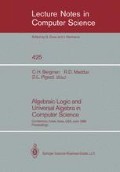The term “optimal algebra”, and some of the other associated terminology, was suggested to us by Vaughan Pratt, who also independently conjectured the existence of optimal normal models (Lemma 7). In addition, Francesco Parisi-Presicce has informed us that in unpublished notes, he too obtained the optimal semantics. Because his definition of it was in terms of optimal fixed points, he also named the semantics “optimal.”
Preview
Unable to display preview. Download preview PDF.
8 References
J. A. Goguen, J. W. Thatcher, E. G. Wagner, and J.B. Wright (ADJ). An initial algebra approach to the specification, correctness, and implementation of abstract data types. In R. T. Yeh, editor, Current Trends in Programming Methodology IV. Prentice-Hall, 1978.
J. V. Guttag and J. J. Horning. The algebraic specification of abstract data types. Acta Informatica, 10(1):27–52, 1978.
M. C. Hoffman and M. J. O'Donnell. Programming with equations. ACM TOPLAS, 4(1):83–112, 1982.
S. Kamin. Final data types and their specifications. ACM TOPLAS, 5(1):97–121, 1983.
D. Kapur and D. R. Musser. Proof by consistency. General Electric Corporate Research and Development Report 84 GEN008, 1984.
D. Kapur and D. R. Musser. Inductive reasoning with incomplete specifications. In Proceedings of the Symposium on Logic in Computer Science, pages 367–377, 1986.
R. Milner. Fully abstract models of typed λ-calculi. Theoretical Computer Science, 4:1–22, 1977.
R. Milner. A proposal for standard ML. In Proc. 1984 Symp. on LISP and Functional Programming, pages 184–197. ACM, 1984.
L. S. Moss, J. Meseguer, and J. A. Goguen. Final algebras, cosemicomputable algebras, and degrees of unsolvability. Theoretical Computer Science, To Appear.
M. Nivat. On the interpretation of recursive polyadic program schemes. Symposia Mathematica, 15:255–281, 1975.
J. C. Raoult and J. C. Vuillemin. Operational and semantic equivalence between recursive programs. J. Assoc. Comp. Mach., 27(4):772–776, 1980.
S. R. Thatte. Full abstraction and limiting completeness in equational languages. Theoretical Computer Science, 65(1), 1989.
D. A. Turner. Miranda: A non-strict functional language with polymorphic types. In LNCS 201. Springer-Verlag, 1985.
C. Wadsworth. The relation between computational and denotational properties for Scott's D∞ models of the λ-calculus. SIAM Journal of Computing, 5(3):488–520, 1976.
M. Wand. Final algebra semantics and data type extensions. Journal of Computer and System Sciences, 19(1):27–44, 1977.
Author information
Authors and Affiliations
Editor information
Rights and permissions
Copyright information
© 1990 Springer-Verlag Berlin Heidelberg
About this paper
Cite this paper
Moss, L.S., Thatte, S.R. (1990). Optimal semantics of data type extensions. In: Bergman, C.H., Maddux, R.D., Pigozzi, D.L. (eds) Algebraic Logic and Universal Algebra in Computer Science. ALUACS 1988. Lecture Notes in Computer Science, vol 425. Springer, New York, NY. https://doi.org/10.1007/BFb0043083
Download citation
DOI: https://doi.org/10.1007/BFb0043083
Published:
Publisher Name: Springer, New York, NY
Print ISBN: 978-0-387-97288-6
Online ISBN: 978-0-387-34804-9
eBook Packages: Springer Book Archive

